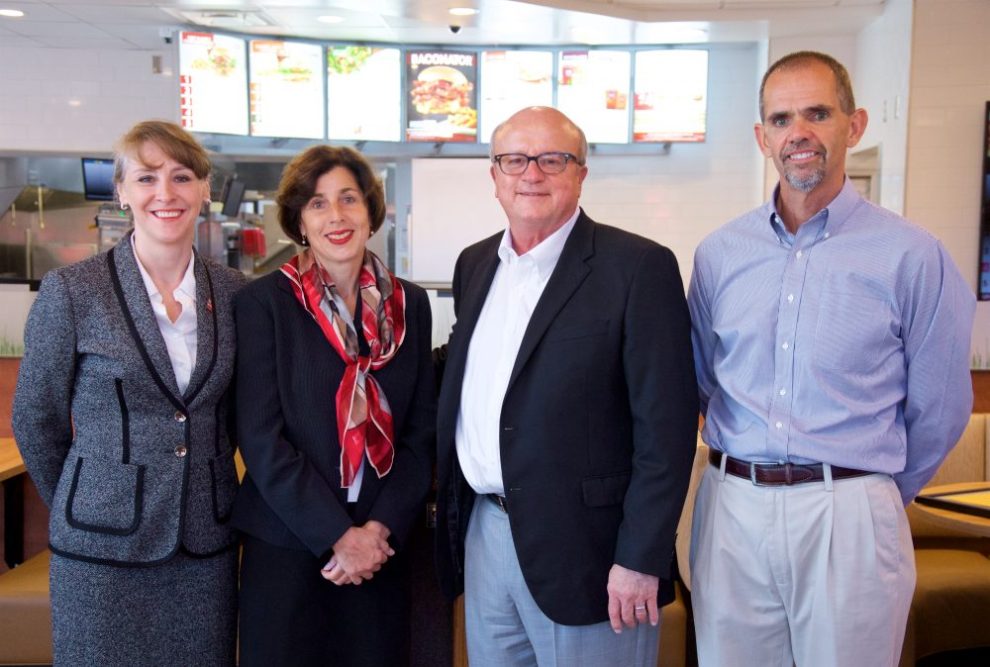
The U.S. Department of Energy has recognized The Wendy’s® Company (NASDAQ: WEN) and one of its franchisees, Wendco Group, for their partnership in the Better Buildings Challenge and for leadership in energy efficiency. The Wendy’s Company has made a commitment to reduce energy consumption in U.S. company-owned restaurants by 20 percent per transaction by 2025. Wendy’s is also the first restaurant company to include franchisees in the Better Buildings Challenge. To date, six franchisees have joined and more than 570 company and franchisee operated restaurants are participating in this program.
The Wendy’s Company is the world’s third-largest quick-service hamburger company. The Wendy’s system includes approximately 6,500 franchise and Company-operated restaurants in the United States and 28 countries and U.S. territories worldwide. For more information, visit www.aboutwendys.com.
“We’re proud to be among the first restaurant companies to join the Better Buildings Challenge. We see environmental stewardship in restaurant development as a big responsibility, and it connects to our values,” said Abigail Pringle, Chief Development Officer for The Wendy’s Company. “We believe stewardship is a journey, a long-term commitment. It’s not something we are simply ‘checking off the list,’ rather we’re driving purposeful change with bold goals that are brought to life through our culture and our business practices of how we plan, design, engineer, construct and operate our restaurants.”
Today, an official with the Department of Energy visited the Wendy’s restaurant located at 3113 Airport Blvd. in Mobile, Ala., a Wendco Group owned location. This restaurant is being featured as a Showcase Project for the Better Buildings Challenge, a program that aims to make commercial, public, industrial and residential buildings 20 percent more energy efficient over the next decade. This means saving hundreds of billions of dollars on energy bills, reducing greenhouse gas emissions and creating thousands of jobs.
Wendco Group, the first Wendy’s franchisee to join the Better Buildings Challenge, operates 43 Wendy’s restaurants in Alabama and Florida and employs more than 1,200 people. Wendco Group has pursued aggressive strategies for lowering energy use across their building portfolio, including ongoing equipment maintenance, strategic energy upgrades and high efficiency equipment installation. Wendco Group’s restaurant in Mobile, Ala., achieved remarkable energy reduction with energy use per transaction falling by more than 50 percent. Overall energy savings since project completion equals nearly $8,000, despite an 18 percent increase in electric utility rates.
“The leadership demonstrated by Wendy’s and its franchisee is tremendous,” said Maria T. Vargas, Better Buildings Challenge director, U.S. Department of Energy. “Not only is The Wendy’s Company focused on bettering its own corporate-level energy efficiency, it is doing so in a way that can reach thousands more restaurants. This approach with Wendco Group is exemplary of a commitment to continuous improvement, a dedication to greater savings, and proof that partnerships extend energy savings.”
Wendy’s has made a long-term commitment to energy conservation and sustainability.
LEED® certified: More than six years ago, the restaurant company built two LEED certified restaurants, one in Bridgeton, Mo., and the other in Atlanta, Ga., to gain learnings and explore the possibility of incorporating energy conservation efforts in new and existing restaurants. The Thomas Building and Conference Center, constructed in 2012 and located on the campus of the Wendy’s Restaurant Support Center in Dublin, Ohio, was awarded the LEED Silver certification in spring 2013 for designing and constructing a building to sustainable standards including energy efficient lighting, HVAC and converting the parking lighting to LED.
Upgrades: Over the past three years, Wendy’s has accelerated progress in reducing energy use by implementing more than 1,100 individual energy upgrade projects at more than 550 restaurants. These projects include the installation of LED lights in the interior and exterior, upgrading HVAC systems and installing more efficient motors in walk in coolers. These actions have saved more than 13 million kilowatt hours (kWh) which, for comparison, translates into the amount of electricity to power nearly 1,200 average U.S. homes for a year.



